KSrelief partners with WHO to save lives from COVID-19
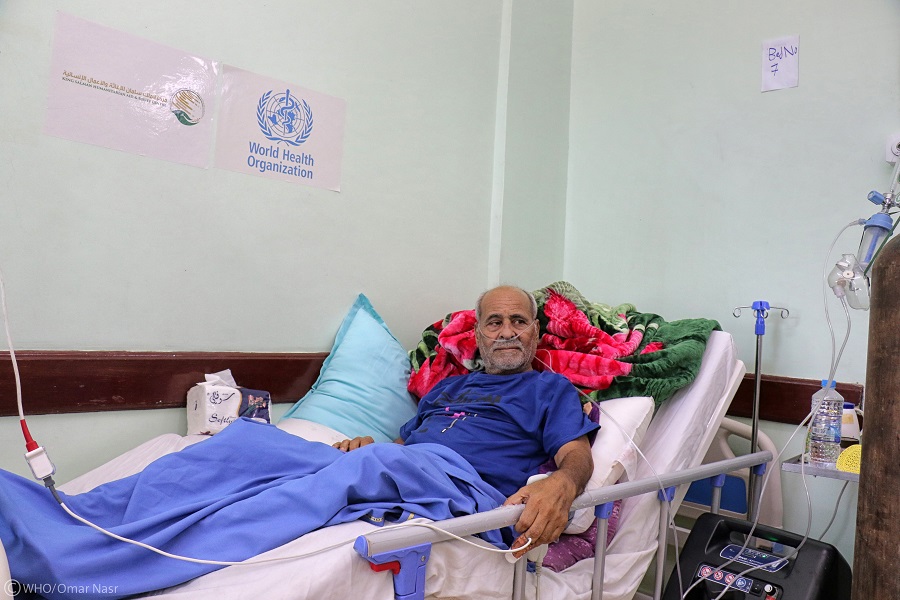
5 August 2021 – Two months ago, Ali Mothana was battling for his life in a COVID-19 isolation unit in Al Sadakah hospital in Aden after being infected with the COVID-19 virus.
“When I was rushed to the hospital, I was suffering from unbearable pain, and my condition was extremely difficult,” recounted Ali, 64. “I thought that it was the end, and that I would not be able to see my grandchildren again.”
COVID-19 has exacted a heavy toll on Yemen, a country that also faces the world’s most complex and dire humanitarian crisis. Like countless other Yemenis, Ali was not believing on how contagious and deadly COVID-19 could be – until it nearly killed him.
“I never ever thought that I would be diagnosed with COVID19. We were in complete denial of the existence of this pandemic, and ignored all precautionary measures.”
The number of confirmed cases of COVID-19 in Yemen is 7016 and 1374 deaths. Still, these numbers do not present an accurate picture of the actual number of cases, due primarily to their under-reporting in Yemen.
Fortunately for Ali, he sought treatment at the WHO-supported intensive care unit in Al Sadakah hospital in Aden. “When I was admitted to the hospital my case was severe and I stayed in the intensive care unit for a long time. I am very fortunate to have received the care I needed. I would have never expected to receive such care – it saved my life”.
Partnering to save lives
WHO is partnering with the King Salman Centre for Humanitarian Aid and Relief in the fight against COVID-19 in Yemen. Through this partnership, and in coordination with local authorities, WHO has been enabling rapid detection and response to COVID-19 cases through the Emergency Operations Centres, which represent a platform for an integrated, multisectoral coordination system at central and governorate levels across the country.
“I have finally passed the critical stage and started recovery,” Ali said. “I can never thank enough the white army (health workers) who are putting their lives at risk to save ours. Now I can continue my life with my grandchildren and teach them to be role models – like these health workers who saved my life”.
Sameh is one of thousands of patients being treated for COVID-19 through WHO and KSrelief support across Yemen
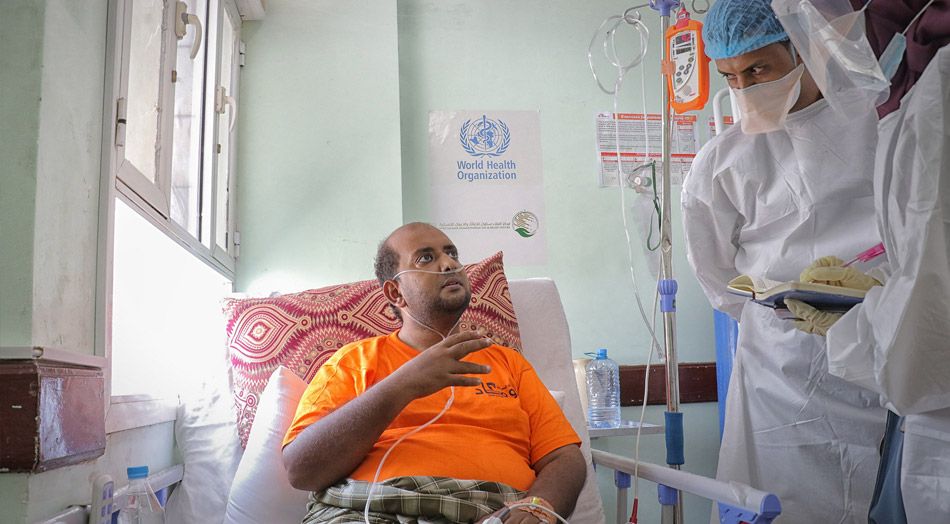
14 July 2021 – In the midst of a humanitarian crisis and a health system debilitated by years of conflict, incessant epidemics and the recent COVID-19 pandemic aggravating the situation further. WHO and the King Salman Humanitarian Aid and Relief Centre (KSrelief) are working together to fill critical gaps and strengthen preparedness and response to COVID-19 and other public health concerns.
Sameh is a father of 3 children – 2 girls and a boy. He works in Al Sadaqqah hospital’s intensive care unit (ICU). Al Sadaqqah is one of the largest hospitals supported by WHO and KSrelief in Aden. When Sameh was infected with COVID-19 around 2 months ago, he stayed home hoping to feel better but his condition worsened and he was rushed to the ICU due to difficulty breathing.
“My health situation was dire. I was kept in the intensive care unit for a week.” He says while out of breath. “I’ve been receiving treatment, monitored oxygen supply and care here at the ICU for 3 weeks now. I feel much better and the doctors report that I’m doing well. But I still need to get regulated supply of oxygen as directed by the doctor,” adds Sameh.
Health care workers in the frontlines of COVID-19 and other diseases are risking their lives daily. And in Yemen, they face compounded challenges due to the damaged infrastructure and socioeconomic difficulties. Yet they continue to work under dire circumstances.
Sameh is one of 2560 people being treated for COVID-19. “The health staff are treating me so well. I would like to extend my thanks to KSrelief for providing this service and all the services they continue to provide in such a critical time. I am grateful I am now better and that I will soon be able to be discharged,” says Sameh.
Partnership to mitigate risks and save lives
To reduce occurrence of infection and to minimize morbidity and mortality of COVID-19 WHO and KSrelief are working to advance pandemic preparedness, early detection of COVID-19, as well as through mounting appropriate control and public health containment measures. The large-scale support includes building local capacity at the ICU level, providing oxygen and essential medical and nonmedical supplies. In addition to supporting the national referral laboratory capacity through provision of equipment and essential supplies, as well as training laboratory staff.
Through this project, 173 health care workers have been trained including 70 laboratory staff in order to build capacity in 14 supported ICUs and 12 supported laboratories. This has made treating 2560 COVID-19 patients possible in WHO and KSrelief-supported facilities between January and June 2021.
WHO partners with KSrelief to enhance the quality of health care in Yemen
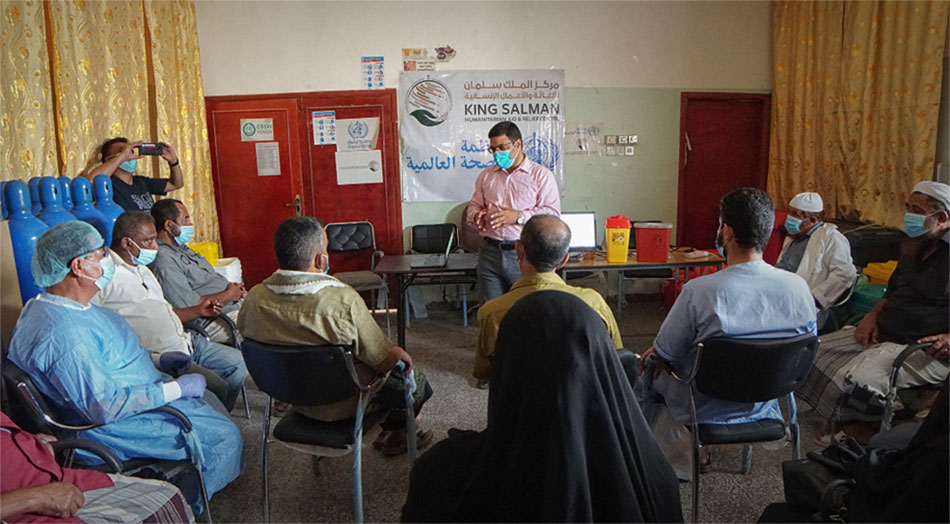 Health staff being trained as prt of the Essentail Health Services project
Health staff being trained as prt of the Essentail Health Services project
18 July 2021 – Quality of care is the degree to which health services increase the likelihood of desired health outcomes and are consistent with evidence-based professional knowledge. This definition of quality of care spans promotion, prevention, treatment, rehabilitation and palliation, and implies that quality of care can be measured and continuously improved through the provision of evidence-based care that takes into consideration the needs and preferences of service users – patients, families and communities. The Sustainable Development Goals stress that quality is a key element of universal health coverage.
Yemen has been in the clutches of a prolonged conflict, economic decline and scarcity of resources, all contributing to extremely poor health outcomes and inadequate quality of care. This has put the lives of the people of Yemen at further risk of death and disease.
WHO and the King Salman Humanitarian Aid and Relief Centre (KSrelief) have started a new project to support the delivery of essential health services in Yemen through improving the provision of quality health care. As part of the project, on-the-job training has been undertaken for 415 health workers to improve the quality of services in 19 health facilities across 7 governorates.
The need to improve the quality of health care in Yemen was identified by a quality of health care assessment conducted by WHO in health facilities in the targeted governorates. The assessment found that the majority of critical quality standards were not being applied in the assessed hospitals, that a culture of quality was almost nonexistent and that hospital management and staff had very limited knowledge regarding basic concepts of quality in health care.
Most of the targeted hospitals did not have infection prevention control (IPC) programmes and did not have a system to apply basic IPC measures, nor a management system for applying critical quality standards for medicines and equipment. This situation endangers the safety of the patients, putting them at high risk of hospital-acquired infections and the associated morbidity.
Dr Fahmi Abdulla works as Deputy Hospital Director and Epidemiological Surveillance Officer in the WHO-targeted Lawdar hospital in Abyan governorate. He says:
“Our work entails dealing with patients with great care and passion. We are responsible for the lives of our patients, and we do not take this responsibility lightly. In our work environment, meticulous skill is needed to provide quality health care.”
This is echoed by Dr Raja’a Abdulrahman, Emergency Department Officer at Ahwar hospital in Abyan governorate, who says:
“Not only do we need to save the lives of our patients, but also to maintain our own safety from infection. The training we received is therefore critical. We were trained on procedures to ensure the safety of patients as well as health workers through applying critical infection control standards and the management of quality health standards.”
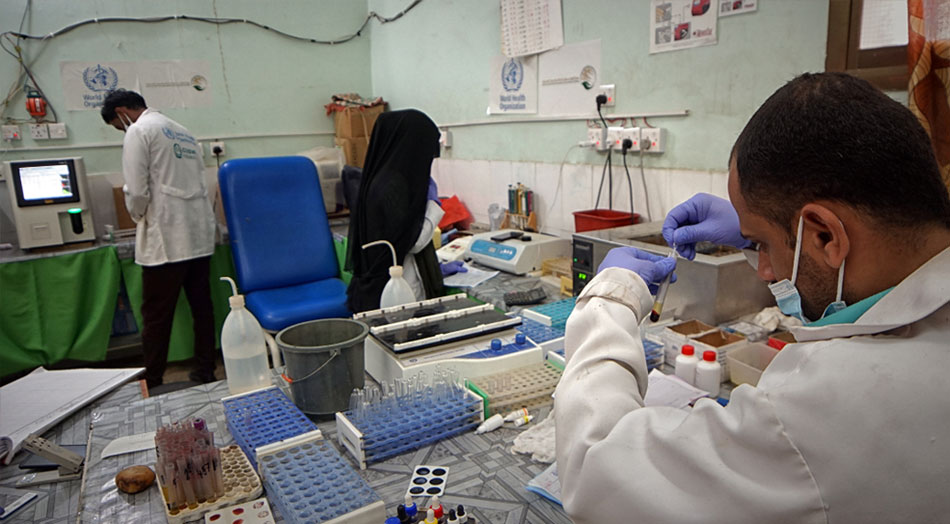 Participants were trained on quality of care and patient safety
Participants were trained on quality of care and patient safety
The training provided by the project aims to fill the existing gaps in quality health care in Yemen. It included discussion of the spectrum of quality concept and quality policies and improvement for health care procedures. Participants were trained on quality of care and patient safety, including the International Patient Safety Goals, and in leadership and management quality standards and skills. The training also covered human resources quality standards, including policies and standards related to the availability and qualification of staff, training of staff and staff satisfaction.
Of the training, Dr Mahdi, Head of the Laboratory Department at Shahid Saleh hospital, says:
"Training in the field of quality health care is being held for the first time in Yemen. This model is newly introduced to our health facilities and to the health system at large. Before this training, health services were lacking these structures due to the absence of infection prevention and control measures and quality health care standards. Both our lives and the lives of patients were placed at risk. Health services should be provided by qualified staff to ensure the provision of effective and safe health care.”
As an outcome of the training, quality programmes in the targeted hospitals have been initiated and the hospitals have started working on developing their organograms and job descriptions.
According to Dr Fahmi Abdulla:
“Applying leadership and management quality standards, in addition to creating organograms and clear job descriptions, has proven extremely beneficial in improving the quality of health care. We have also been equipped with proficiencies that will enable us to safely organize patients and those who accompany them.”
The hospitals are rolling out quality programmes and on-the-job training in quality standards for the rest of their staff to improve the provision of effective and safe health care services and the implementation of critical quality standards.
Dr Mohammed Al Sanea, head of the COVID-19 isolation centre in Al Makha hospital, says that:
“We have been helped by receiving much-needed knowledge for managing epidemic cases, sterilization and sorting cases, as well as improving the quality of health care. We have already started applying the learnt procedures in the COVID-19 isolation centres.”
This critical capacity-building training is part of the Essential Health Services project supported through partnership with KSrelief, which aims to improve the quality of care in Yemen and ensure that health services are effective, safe and patient-centered in around 19 health facilities across the country, reaching 2 million people.
Polio vaccination against the odds in Yemen: dispatches from the frontline of polio eradication
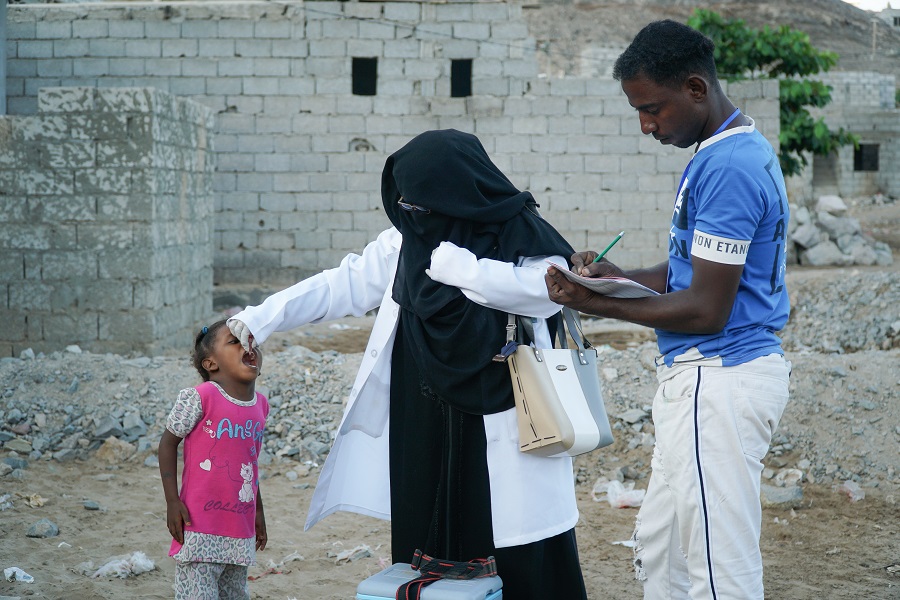
Muneera Abdo is one of thousands of vaccinators across Yemen working tirelessly to reach every last child with polio vaccine
22 June 2021 – In Al-Buraika district, a poor neighbourhood in the port city of Aden in Yemen’s south, Muneera Abdo slowly makes her way through the sandy streets. With a scuffed plastic cool box hanging from a strap on her shoulder, Muneera knocks on the doors of houses often made of little more than discarded strips of tin.
Muneera is a polio vaccinator working in some of the most challenging territory on earth. She travels door to door, vaccinating children under 5 and raising awareness about the importance of vaccination among parents, many of whom are hesitant about vaccines or refuse outright to vaccinate their children.
“My happiest moment is when I serve my community and contribute to saving the lives of children,” said Muneera.
Muneera is one of thousands of vaccinators across Yemen. Their job is simple, yet overwhelmingly tough: reach every last child with polio vaccine, as many times as it takes to stamp out the virus. Vaccinators travel vast distances across deserts and over hills and mountains to reach communities living far from population centres.
Muneera’s job has never been so important. After more than 15 years without a case of polio, an outbreak of vaccine-derived poliovirus was confirmed in Yemen in 2020. Since then, millions of children have received oral polio vaccine on multiple mass immunization days, to boost immunity and stop the outbreak.
Tayseer Ahmed went door-to-door in Thula district, in the steep, long mountains of Amran governorate in the country’s north during the November 2020 and May 2021 campaigns.
“It’s a daunting job,” said Tayseer, “but tiredness fades away whenever I see parents bringing their children to be vaccinated without any hesitancy.”
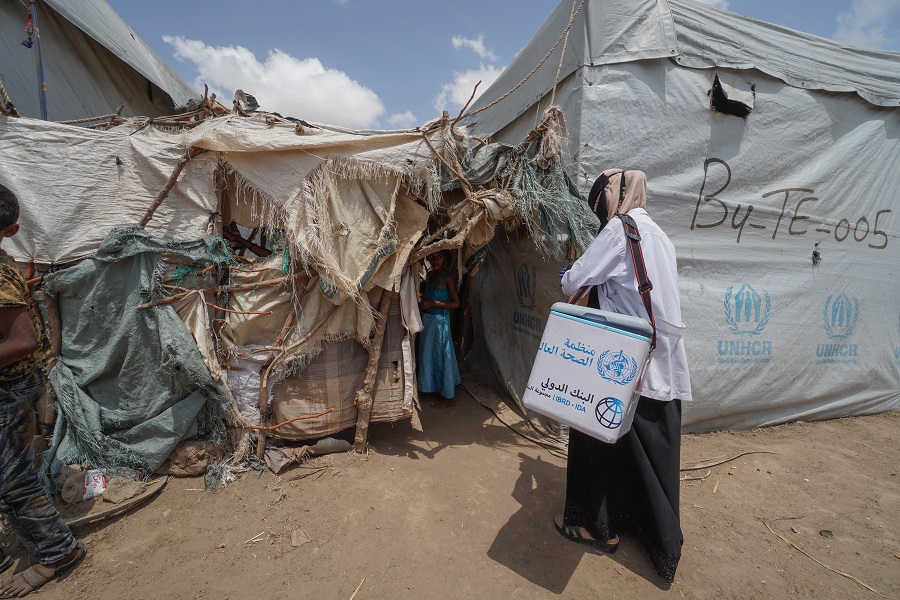 Sometimes, vaccinators in Yemen reach the end of a long and difficult road, only to continue on foot for hours more
Sometimes, vaccinators in Yemen reach the end of a long and difficult road, only to continue on foot for hours more
Conflict delays polio campaigns
Without vaccinators like Muneera and Tayseer, Yemen’s damaged health system and the poor sanitation in many villages could see the poliovirus easily spread from child to child across the country. The conflict and instability that have plunged parts of the country into a prolonged humanitarian crisis have lowered vaccination rates and delayed campaigns, leaving more children vulnerable to the virus.
As of 20 June 2021, a total of 34 children have been paralysed in the outbreak. This grim toll highlights both Yemen’s immunity gap and the challenges of delivering health care in a conflict. Immunization rates in Sa’adah governorate – the epicentre of the outbreak – have declined in the past 16 years since the last house-to-house campaign was conducted in 2004.
Responding to the urgent need to deliver vaccination services to all children in this governorate, WHO and UNICEF, in cooperation with the Ministry of Public Health and Population, have conducted health outreach activities there, targeting around 200 000 children under 5 with polio and other vaccines, and offering other health and nutritional support. Additional rounds of outreach will continue over the course of 2021.
The uptake of services has been informative: the main draw for families was the bundle of health services under the heading “Integrated Management of Childhood Illnesses” (IMCI), which supports children under 5 with health care, including vaccinations. In the first round of outreach, trained health workers provided IMCI treatment to 44 624 children under 5. Of these children, 4967 were under 2 months of age and were vaccinated for the first time.
But in order for these efforts to close Yemen’s immunity gap, they need to be sustained – no easy feat.
“Despite all security and humanitarian challenges, we’ve succeeded in conducting several rounds of vaccination campaigns across the country, reaching millions of children with polio vaccine. However, there's still so much work to be done to contain the current outbreak from spreading further,” said Dr Adham Abdel-Moneim, WHO Representative in Yemen.
As vaccinators like Muneera and Tayseer know, that work can only be done step by step, door to door, child by child. It is an immensely tough job – logistically challenging, but also physically and emotionally gruelling. For this reason, the people at the ground level of polio eradication often view their work not as a job, but as a calling.
“For me, protecting children against diseases is more humanitarian work than a paid job,” said Muneera.








